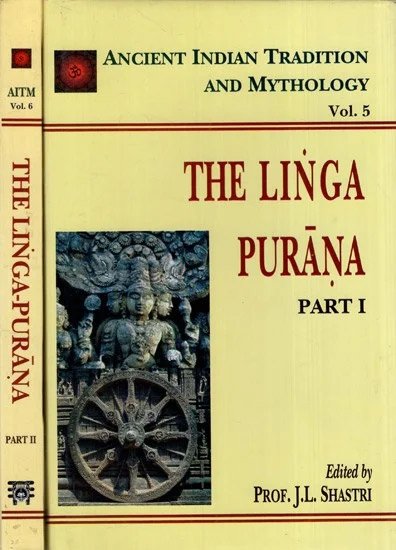The Linga Purana
by J. L. Shastri | 1951 | 265,005 words | ISBN-10: 812080340X | ISBN-13: 9788120803404
This page describes The twelve-syllabled Mantra which is chapter 7 of the English translation of the Linga Purana, traditionally authored by Vyasa in roughly 11,000 Sanskrit verses. It deals with Shaiva pilosophy, the Linga (symbol of Shiva), Cosmology, Yugas, Manvantaras, Creation theories, mythology, Astronomy, Yoga, Geography, Sacred pilgrimage guides (i.e., Tirthas) and Ethics. The Lingapurana is an important text in Shaivism but also contains stories on Vishnu and Brahma.
Chapter 7 - The twelve-syllabled Mantra
The sages said:
1-2. By repeating which mantra is the creature liberated from worldly fears? How does he become free from sins and attain salvation? By what Japa does he eschew Alakṣmī? How does a man become the abode of Lakṣmī (good fortune)? O Sūta, it behoves you to recount this.
Sūta said:
3. For the benefit of all the worlds I shall mention succinctly everything that had been formerly mentioned by Brahmā to the noble-souled Vasiṣṭha.
4-8. May all listen to my words after bowing down to Viṣṇu who is the lord of Devas, who is unborn, who is all-pervading, who is the eternal Kṛṣṇa, Acyuta, who dispels all sins, who is pure, who bestows liberation on the expounders of Brahman.[1] He who is a scholar, he who performs meritorious deeds sḥall always repeat the names of Nārāyaṇa after making obeisance to him mentally, verbally and physically. One shall remember lord Viṣṇu while sleeping, walking, taking food, standing, keeping awake, opening or closing the eyes. O brahmins, he shall remember the eternal lord repeating the words—Namo Nārāyaṇāya (Obeisance to Nārāyaṇa). He who inspires edibles, beverages and lambatives by reciting the mantra “namo nārāyaṇāya” touches it and then partakes of it, attains the greatest salvation.
9-14. He gets rid of all sins and attains the goal of the good. The deity who is mentioned by me as Alakṣmī, the wife of Duḥsaha, undoubtedly departs, on hearing the word “Nārāyaṇa”. O sages of good holy rites, Lakṣmī, who is the beloved wife of Viṣṇu, Kṛṣṇa the lord of Devas, resides in his body, house, abode and field. After looking up all the sacred texts, after pondering over them again and again this is the outcome that Nārāyaṇa should always be meditated upon. Of what avail are the multifarious mantras unto him, of what avail are the numerous holy rites unto him? The mantra “namo nārāyaṇāya” (obeisance to Nārāyaṇa) is the means for achieving all objects. Hence, one shall repeat the mantra “namo nārāyaṇāya” on all occasions. O leading brahmins, he goes to the world of Viṣṇu along with his kinsmen. O excellent sages, listen to another mantra of the lord of Devas,
15-16a. This mantra had been learned and practised by me formerly. It is the means of achieving the essence of the Vedas. It is an ancient one consisting of twelve syllables and twelve forms. I shall tell you, in brief, the greatness of the same.
16b-18. There was a certain brahmin of great intellect. He performed penance and with very great difficulty procreated a son. In due course he performed all consecratory rites on his behalf. At the proper time he invested him with the sacred thread. He taught him but the son did not utter anything[2]. His tongue did not throb at all. The excellent brahmin became dejected.
19-20. But Aitareya (the son of brahmin) invariably uttered the name Vāsudeva.[3] His father married another lady duly and procreated many sons who learned the Vedas and became richly endowed with learning. They were honoured by everyone.
21-23. Aitareya’s mother became excessively sad and dejected. She said:—“Richly accomplished sons who have mastered the Vedas and ancillary subjects and who are honoured and worshipped by brahmins delight their mother. But you a shapeless[4] son are born to me, a women devoid of good luck. My death would have been far better. On being told thus, he (Aitareya) went out to the sacrificial hall.
24. When he entered there the mantras did not come out from the mouth of the brahmins. As long as Aitareya stayed there the brahmins continued to be deluded.
25-27. But when Aitareya uttered Vāsudeva, their voices came out. Those brahmins bowed down and worshipped Aitareya. Then the yajña continued and Aitareya concluded it by means of wealth and other things. In the end with great concentration he repeated the Vedas along with their ancillaries in the Vidatha Assembly of priests. O brahmins, Brahmā and other brahmins eulogised him.
28-33. Siddhas and Cāraṇas moving about in the firmament showered flowers. O excellent brahmins, after concluding the yajña thus, Aitareya worshipped his mother and went to the abode of Viṣṇu. Thus, the greatness of the twelve-syllabled mantra has been recounted wholly. It destroys the great sins of those who read and listen to this. The man who repeats this unchanging twelve-syllabled mantra continuously attains the divine, incomparable great region of Viṣṇu even if he follows a sinful conduct. He who is interested in the twelve-syllabled mantra surely attains the greatest abode. There is no doubt, O sages of good holy rites, that noble-souled men maintaining their own holy rites and devotedly following Vāsudeva attain the divine abode.
Footnotes and references:
[1]:
mokṣadam brahma-vādinām Śivatoṣiṇī. that which renders salvation to those who know the Vedas. This excludes the possibility of salvation for those not conversant with the Vedas.
[2]:
[3]:
Vāsudeva i.e. either the complete twelve-syllabled mantra “oṃ namo bhagavate vāsudevāya” or merely Vāsudeva, a part of this mantra.
